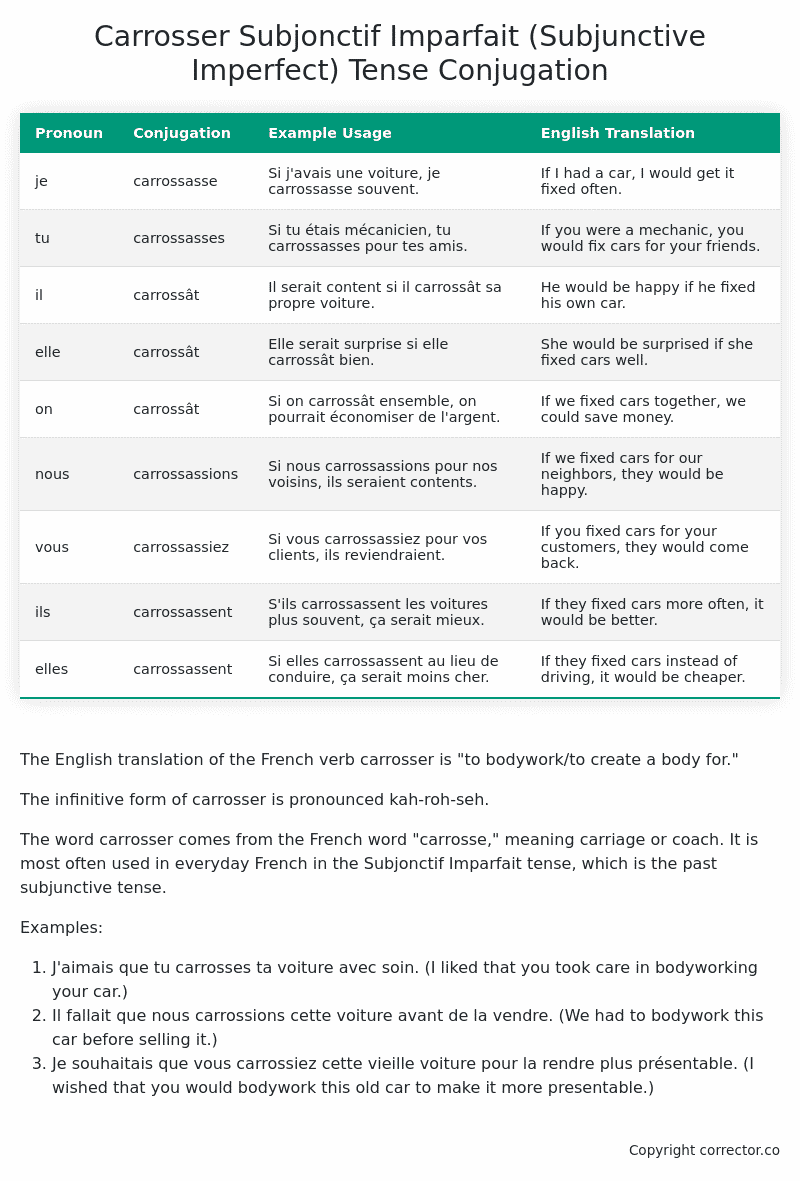Subjonctif Imparfait (Subjunctive Imperfect) Tense Conjugation of the French Verb carrosser
Introduction to the verb carrosser
The English translation of the French verb carrosser is “to bodywork/to create a body for.”
The infinitive form of carrosser is pronounced kah-roh-seh.
The word carrosser comes from the French word “carrosse,” meaning carriage or coach. It is most often used in everyday French in the Subjonctif Imparfait tense, which is the past subjunctive tense.
Examples:
- J’aimais que tu carrosses ta voiture avec soin. (I liked that you took care in bodyworking your car.)
- Il fallait que nous carrossions cette voiture avant de la vendre. (We had to bodywork this car before selling it.)
- Je souhaitais que vous carrossiez cette vieille voiture pour la rendre plus présentable. (I wished that you would bodywork this old car to make it more presentable.)
Table of the Subjonctif Imparfait (Subjunctive Imperfect) Tense Conjugation of carrosser
| Pronoun | Conjugation | Example Usage | English Translation |
|---|---|---|---|
| je | carrossasse | Si j’avais une voiture, je carrossasse souvent. | If I had a car, I would get it fixed often. |
| tu | carrossasses | Si tu étais mécanicien, tu carrossasses pour tes amis. | If you were a mechanic, you would fix cars for your friends. |
| il | carrossât | Il serait content si il carrossât sa propre voiture. | He would be happy if he fixed his own car. |
| elle | carrossât | Elle serait surprise si elle carrossât bien. | She would be surprised if she fixed cars well. |
| on | carrossât | Si on carrossât ensemble, on pourrait économiser de l’argent. | If we fixed cars together, we could save money. |
| nous | carrossassions | Si nous carrossassions pour nos voisins, ils seraient contents. | If we fixed cars for our neighbors, they would be happy. |
| vous | carrossassiez | Si vous carrossassiez pour vos clients, ils reviendraient. | If you fixed cars for your customers, they would come back. |
| ils | carrossassent | S’ils carrossassent les voitures plus souvent, ça serait mieux. | If they fixed cars more often, it would be better. |
| elles | carrossassent | Si elles carrossassent au lieu de conduire, ça serait moins cher. | If they fixed cars instead of driving, it would be cheaper. |
Other Conjugations for Carrosser.
Le Present (Present Tense) Conjugation of the French Verb carrosser
Imparfait (Imperfect) Tense Conjugation of the French Verb carrosser
Passé Simple (Simple Past) Tense Conjugation of the French Verb carrosser
Passé Composé (Present Perfect) Tense Conjugation of the French Verb carrosser
Futur Simple (Simple Future) Tense Conjugation of the French Verb carrosser
Futur Proche (Near Future) Tense Conjugation of the French Verb carrosser
Plus-que-parfait (Pluperfect) Tense Conjugation of the French Verb carrosser
Passé Antérieur (Past Anterior) Tense Conjugation of the French Verb carrosser
Futur Antérieur (Future Anterior) Tense Conjugation of the French Verb carrosser
Subjonctif Présent (Subjunctive Present) Tense Conjugation of the French Verb carrosser
Subjonctif Passé (Subjunctive Past) Tense Conjugation of the French Verb carrosser
Subjonctif Imparfait (Subjunctive Imperfect) Tense Conjugation of the French Verb carrosser (this article)
Subjonctif Plus-que-parfait (Subjunctive Pluperfect) Tense Conjugation of the French Verb carrosser
Conditionnel Présent (Conditional Present) Tense Conjugation of the French Verb carrosser
Conditionnel Passé (Conditional Past) Tense Conjugation of the French Verb carrosser
L’impératif Présent (Imperative Present) Tense Conjugation of the French Verb carrosser
L’infinitif Présent (Infinitive Present) Tense Conjugation of the French Verb carrosser
Struggling with French verbs or the language in general? Why not use our free French Grammar Checker – no registration required!
Get a FREE Download Study Sheet of this Conjugation 🔥
Simply right click the image below, click “save image” and get your free reference for the carrosser Subjonctif Imparfait tense conjugation!

Carrosser – About the French Subjonctif Imparfait (Subjunctive Imperfect) Tense
Formation
Common Everyday Usage Patterns
Interactions with Other Tenses
Subjonctif Présent
Indicatif Passé Composé
Conditional
Conditional Perfect
Summary
I hope you enjoyed this article on the verb carrosser. Still in a learning mood? Check out another TOTALLY random French verb conjugation!


